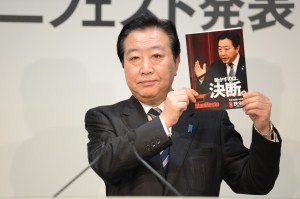

|
On the evening of November 27, DPJ President and Prime Minister Yoshihiko Noda unveiled the 2012 DPJ Manifesto with five priority issues: (1) Reform of social security systems, (2) New and sustainable economic growth, (3) Energy reform for zero operation of nuclear power plants, (4) Realistic policies for Japanese diplomacy and defense as a peaceful state, and (5) Reduction in the number of Diet members and transition from hereditary politics. President Noda opened by posing two questions to the people, asking “Will we move forward with the reforms entrusted to us since the historic change in government, or will we turn back the clock and return to the politics of the past which was tainted by fetters and vested interests? Are we going to leave the steering of the nation to parties who are only working together because of the election, and have no consistency in their philosophy or direction?”
President Noda stated that “The 2009 DPJ Manifesto was one factor that contributed to the DPJ’s victory in the general election at the time. We deeply apologize for the fact that, regrettably, we were unable to address some of the issues in the 2009 Manifesto. Based on the lessons we have learned and reflecting on the past three years, we have developed the 2012 Manifesto for the forthcoming general election.” Noda reported that the Manifesto Development Committee developed the Manifesto while bearing in mind the opinions exchanged within the party, including those voiced in town meetings for debriefing DPJ policies that were held in 11 cities and local branches. In response to the opinion that “The 2009 Manifesto prescribed concrete action plans and financial resources for various issues; however, the readers had difficulty understanding the DPJ’s philosophy or the DPJ’s vision for the future of society,” Noda explained the development process of the 2012 Manifesto and said “While developing this year’s Manifesto, we made a real effort to describe our vision for society, and the values and principles we are aiming for. We also considered the lessons learned about the possible occurrence of unexpected disasters, such as the Great East Japan Earthquake, and have therefore created the Manifesto using feasible figures and financial sources that allow us to respond flexibly to various possible situations.” In addition, Noda explained that the Manifesto placed the highest priority on restoration from the Great East Japan Earthquake, in line with the idea that “There can be no restoration of Japan without the restoration of Fukushima,” a matter on which PM Noda places the utmost importance.
Reviewing the experiences of his administration, Noda expressed his continued belief in the value of an election campaign focusing on the party’s Manifesto, stating “During my terms as Prime Minister, I had a difficult time enacting the policies in the 2009 Manifesto; however, I believe that publicizing the Manifesto and pitching our policies to the people, and thereby opening ourselves up to close public scrutiny, is a fundamental part of politics.”
|

